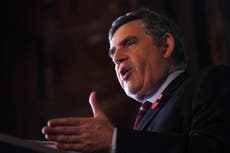The Independent's journalism is supported by our readers. When you purchase through links on our site, we may earn commission.
I saw the tragic end of Labour's years in government first hand – its consequences are still with us
Seeing where the Labour Party is now, maybe a sea change was already under way that Tony and I were too slow to recognise and, frankly, still find difficult to understand. Brexit? Corbyn? Trump?

“The thing I am most interested in,” said The Independent’s John Rentoul in asking me to write this piece, “is how, given all you knew about what Gordon did to damage Tony, you nonetheless went back to help him when he finally became prime minister?” No prizes for guessing which Tony and Gordon we were talking about.
John, I know from his encyclopaedic knowledge, has read every word of the previous six volumes of my diaries, and volume seven, From Crash to Defeat, covers the Brown premiership. He was not alone in asking that question. Richard Stott, my first editor, and Ed Victor, my agent, who had read the full version of my diaries before a word was published, were shocked I would even consider going back to help, given the TBGB horrors I had witnessed and recorded.
I guess that tribalism is the easy answer, and it is certainly part of it; and I was saddened at the time, and am saddened now, that Gordon lost the election eight years ago. How not to be sad if, like me, you prefer Labour governments led by Tony Blair and Gordon Brown to Tory governments led by David Cameron and Theresa May. Sad if, also like me, a part of you wonders if you could have done more to help prevent the Tories getting back. Sad, definitely, when you look at the state of our politics today, in 2018, and wonder how we got from where we were to where we are. We as in Britain. We as in Labour. We as in politics. We as in the world.
It is the more personal question that keeps gnawing away: could I have done more? Gordon certainly thought so. I had forgotten just how relentless he was in trying to get me to return. All sorts of roles, up to and including a place in his cabinet, were suggested as a way of getting me to commit beyond my half-in, half-out position. I did go back for the last few months, but never in quite the way he was asking.
Both my psychiatrist, and my partner Fiona, felt Gordon was playing to my “demon” – a desire to be needed, to be central; to be seen as having talents that others don’t; to be told “I cannot do this without you”. There might be something in that. But also, if you are British, and Labour, it is not easy saying “No” to a Labour Party prime minister. I have always felt a real sense of duty to Labour. But that sense of service is often in conflict with the sense of self; and whereas with TB I perhaps overdid the service and neglected the self (and my family), by 2007 I was less willing to have my whole life taken over again.
I did, and I do, feel a certain guilt about the agonising and the stopping short of what he wanted. I did my bit. I helped with strategy and speeches; I played David Cameron to GB’s Gordon in preparation for the TV debates; I was pretty much full-time in the campaign itself, and was there at the very end, listening in when GB told Nick Clegg he could keep the Queen waiting no longer, and he intended to resign. Sad. There was a particularly poignant moment when GB was on the phone to TB, shortly before leaving to see the Queen, and Peter Mandelson and I were there in the room, overhearing what was, compared with many, a comradely and compassionate conversation. The four of us had been through a lot together; good and bad.
It was in some ways the culmination of a tragedy. The seeds of that tragedy are clear across all volumes of my diaries. Tony felt GB’s distancing from New Labour on becoming prime minister was a mistake, and he viewed a new top rate of tax in the same vein; I certainly argued that Gordon sought too hard to define himself against Tony, rather than against Cameron.

This volume sees the first seeds of the next Labour Shakespearean drama growing: that of the Miliband brothers. And might it be, seeing where the Labour Party is now, that a sea change was already under way that Tony and I were too slow to recognise and, frankly, still find difficult to understand? Brexit? Corbyn? Trump?
Preventing David Cameron from securing an overall majority was a triumph of sorts. That Cameron required the support of Clegg to get to Number 10 was surely in no small measure down to Gordon’s resilience and huge residual strengths as a political fighter. He was at his best towards the end of the campaign – strangely after its worst moment, namely his suggestion that Mrs Gillian Duffy, a voter concerned about immigration, was a bigot. I don’t think I have ever seen a politician as cut up about a mistake as I saw Gordon afterwards.
That incident seemed to bring together so many of his vulnerabilities. A mistrust of the media, and a clumsiness dealing with it; unease with the public; his tendency to cast around for blame; his inability to match the easy charm of Blair and Cameron. And then all of it climaxing in that sad, sad shot of an exhausted-looking Gordon, head in hands as his ”bigot” outburst was played back to him by Jeremy Vine.
Because of my agonising and depression, this volume risks being unfair to Gordon. If his mood was often dark, mine was often darker. I record many negative thoughts about him, and the impact he was having on the new life I was trying to build. Nor was my mood helped when, into all this, Gordon threw a full public inquiry into the Iraq war. I also record many negative views of others – TB, Peter Mandelson, Philip Gould among them, who feared that GB just could not do the job. Yet we all believed in him enough to want to help, even if we were constantly on the lookout to see whether Alan Johnson or David Miliband might try to take over, and even if Peter was the only one to go back fully (and he did it well).
But the title of this volume is From Crash to Defeat, and whilst Gordon would be the first to accept that as leader of the campaign he takes responsibility for the defeat, he played a hugely impressive role in the global handling of the financial crash.
So the short answer to John’s question is that although I had had experience of the weaknesses, I knew there were many strengths, and that Gordon was a big part of the successes we had had, whatever the failures with which we ended. Thirteen years is the longest period of uninterrupted government the Labour Party has ever had. That too is a success story, sad ending or not. Also, it is a true, rather shocking stat that Eton, the school which educated David Cameron, and helped develop the swagger that made defeat in a referendum on Europe unthinkable, has produced more prime ministers than the Labour Party. Three times as many. Nineteen Old Etonian Prime Ministers. Six Labour. Ramsay MacDonald, Clement Attlee, Harold Wilson, Jim Callaghan, Tony Blair, Gordon Brown. That’s it.
I have been lucky to have known four of them, and worked for two of them. And whatever faults they had, whatever mistakes they made, I remain utterly convinced the governments they led were better for the country than the two prime ministers who have followed them, and many of the fifty-one who preceded them. That, ultimately, is your answer, John.
Alastair Campbell was Tony Blair’s communications director. ‘Alastair Campbell Diaries: Volume 7 – From Crash to Defeat’ is published on 20 September by Biteback and can be purchased at outlets including Amazon




Join our commenting forum
Join thought-provoking conversations, follow other Independent readers and see their replies